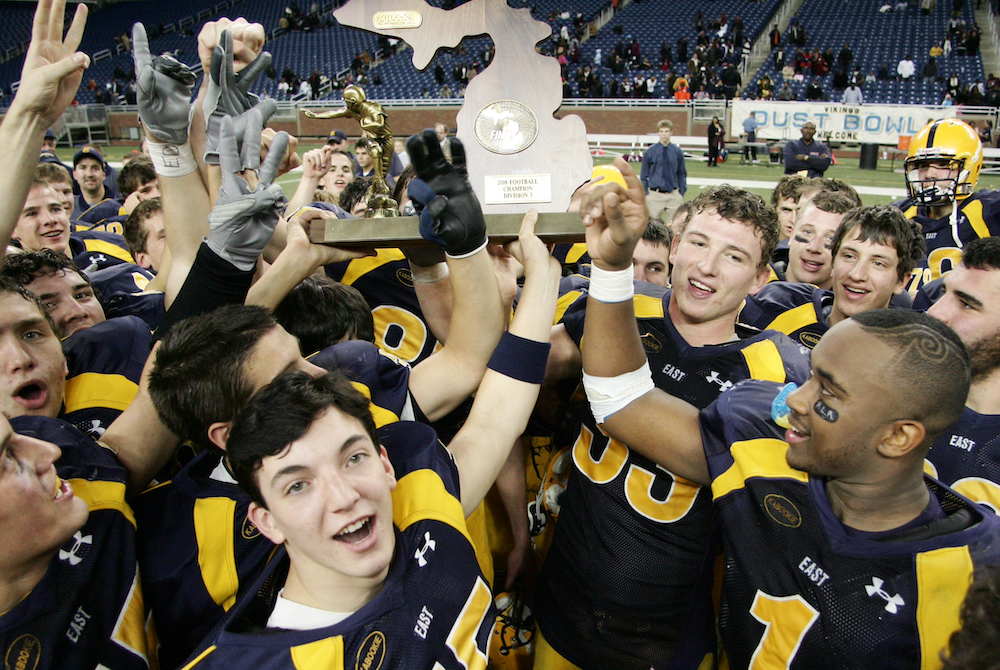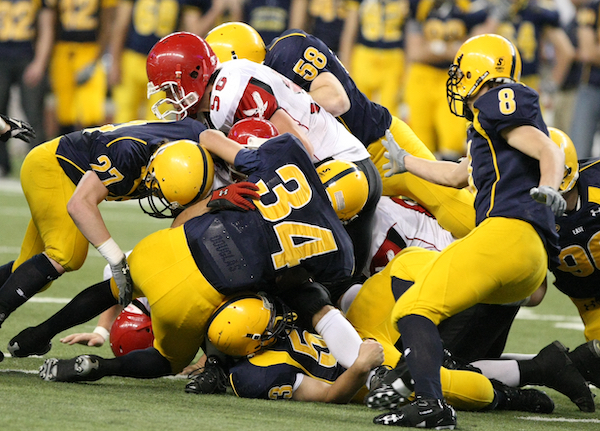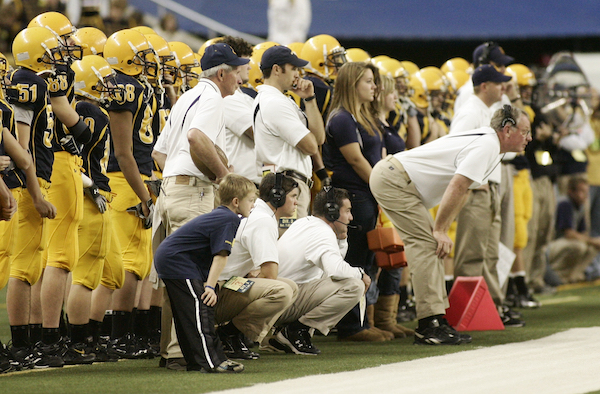
Sand Creek's Muck Making His Move
August 16, 2018
By Doug Donnelly
Special for Second Half
SAND CREEK – Alec Muck doesn’t take for granted that he’s one of the fastest athletes in the state.
 It just makes him want to become faster.
It just makes him want to become faster.
“I’ve always had speed,” said the Sand Creek senior. “I guess you could say I was blessed with speed. But I train hard, too. I do a lot of stuff on my own, I work with a personal trainer and I lift. It motivates me.”
Muck is a five-time MHSAA Finals track champion and has rushed for more than 2,600 career yards for the Aggies’ varsity football team. As he prepares for his senior season on the football field, he said he’s healthy and ready to go out a winner.
“I just want to go out and play hard and give it my all,” he said. “I’m going to do whatever it takes for my team. High school football is so different than anything else. I want to leave it all out there.”
Muck has a future as a college athlete. He’s just not sure in which sport. This summer, he went on a multi-state, multi-campus recruiting tour during which he blazed to a 4.3-second 40-yard time in Columbus, Ohio.
“That definitely caught the attention of a few coaches,” he said. “I kept my time around that 4.3 all summer.”
Other stops on the tour included Louisville, Cincinnati, Findlay and Western Michigan University. The 5-foot-10, 175-pound speedster doesn’t have any formal offers to play college football, but he expects that to change this season.
“I have a passion for both track and football,” he said. “But, I love the grind of football and everything about the game. If I could choose, I’d probably say football. I’ve always wanted to play at the Division I level.”
Muck was part of the Sand Creek varsity football team as a freshman. He blossomed into a weapon as a sophomore. In the third game that season, against Whitmore Lake, he carried the ball 11 times for 277 yards and five touchdowns. It remains his most productive game of his career. In all seven Tri-County Conference games that year, he rushed for at least 100 yards. He went on to rush for 1,505 yards as a sophomore, racking up nearly 2,000 all-purpose yards and 26 touchdowns.
 His junior season saw a slight dip in his carries, but he still averaged more than seven yards per rush and came up two yards short of 1,000. He started the season spending some time at quarterback. That experiment ended early in the season, however, and he expects to line up at several different spots on the field this year – but not quarterback.
His junior season saw a slight dip in his carries, but he still averaged more than seven yards per rush and came up two yards short of 1,000. He started the season spending some time at quarterback. That experiment ended early in the season, however, and he expects to line up at several different spots on the field this year – but not quarterback.
“I like running back,” he said. “That’s where I’ve played since my Pop Warner days. I like to run and see the whole field. Running with the football is way different than running the track. You have to know when to go only 50 percent, so you know where to make your cut, then explode. You have to have more lateral movement.”
Sand Creek coach Scott Gallagher said the Aggies need to find more and creative ways to get Muck the football.
“He’s explosive,” said Gallagher, in his second season leading the program. “We have to put him in different positions and get him the football in a lot of different ways. He’s had the best camp he’s had since I’ve coached him.”
Muck causes headaches for opposing coaches. He is a threat to score every time he touches the ball.
“Obviously Alec has tremendous speed; however, his ability to take over and change a game is underrated,” said Ottawa Lake Whiteford coach Jason Mensing. “His imprint on the TCC will be lasting.”
Gallagher said Muck sets high expectations for himself.
“He’s hard on himself,” Gallagher said. “He is very driven to be successful, and he wants to that success to rub off on his teammates.”
Muck’s training has involved a lot of speed drills – often on his own. His weightlifting is for strength and maintaining speed, not bulking up.
“My normal warm-ups are low sprints, not long-distance running,” he said. “When I run the short sprints, I set a goal for each sprint and try and beat that time. I run for time.”
Prior to the Regional track meet this spring, Muck injured his hamstring. He took a week off running before the Lower Peninsula Division 4 Finals, but the break didn’t slow him as he won both the 100 and 200 dashes. He won the same events as a sophomore and won the 200 as a freshman. His championship winning times this spring were 10.98 seconds in the 100 and 22.02 in the 200.
“I was really careful warming up at the state meet and, in the preliminaries, I ran easy, just so I could get to the final,” he said. “Once I got there, I knew I could do it.”
Throughout a summer of football camps and 7-on-7s, Muck also attended physical therapy for the hamstring. He said he’s now at 100 percent and ready to start football – and go out with a bang.
“This is the most dedicated the team has been since I’ve been playing,” he said. “The offseason training, the commitment to the weight room, it’s all there. I’m just ready to go out there and lead by example. It’s time to play football.”
 Doug Donnelly has served as a sports and news reporter and city editor over 25 years, writing for the Daily Chief-Union in Upper Sandusky, Ohio from 1992-1995, the Monroe Evening News from 1995-2012 and the Adrian Daily Telegram since 2013. He's also written a book on high school basketball in Monroe County and compiles record books for various schools in southeast Michigan. E-mail him at [email protected] with story ideas for Lenawee and Monroe counties.
Doug Donnelly has served as a sports and news reporter and city editor over 25 years, writing for the Daily Chief-Union in Upper Sandusky, Ohio from 1992-1995, the Monroe Evening News from 1995-2012 and the Adrian Daily Telegram since 2013. He's also written a book on high school basketball in Monroe County and compiles record books for various schools in southeast Michigan. E-mail him at [email protected] with story ideas for Lenawee and Monroe counties.
PHOTO: Sand Creek running back Alec Muck is a five-time MHSAA Finals track champion with more than 2,600 career rushing yards. He's healthy and ready for a breakout senior year of football. (Photo by Mike Dickie.)

EGR 5-Year Title Run Remains Awe-Inspiring, Product of More Than Talent Alone
By
Steve Vedder
Special for MHSAA.com
November 25, 2022
It was Peter Stuursma's first year at East Grand Rapids and while the wolves weren't necessarily knocking at the door, they were definitely on the prowl.
The tradition-rich Pioneers football team had slumped to an uncharacteristic 3-6 record in Stuursma's first season as varsity head coach in 2000, and there were subtle signs a community used to winning was growing restless with the program's direction.
That's when Stuursma bumped into one of his players coming out of the weight room, and the two had a quick conversation which he clearly remembers 22 years later.
"It was this senior offensive lineman and all he said was, 'Don't worry about it Coach, it's not going to happen again. We got this,’" Stuursma said. "We had just gone 3-6, and I'm wondering how we're going to get this going and that they might get rid of me. You never underestimate what people can do."
East Grand Rapids, under legendary coach George Barcheski, had been the dominant football program in West Michigan with 28 winning seasons over 29 from 1970-99, and 38 victories in 39 games from 1993-95, along with Class B championships in 1976 and 1983. After Stuursma replaced the retiring Barcheski,, some in the community were expecting more of the same when it came to success.
Those fans never dreamed what they would see as the Pioneers promptly pieced together arguably the greatest decade-long stretch in Michigan high school football history – and without doubt one of the most incredible five-year runs of dominance.
Even that optimistic offensive lineman couldn't have imagined a remarkable 126-7 record over the next 11 years, a 40-3 MHSAA Tournament mark and seven Finals championships. Five of those titles (2006-10) came in a row, a feat accomplished just three times in the now 46-year history of the playoffs.
 The five straight championships were part of an amazing era that Stuursma and his players say has not diminished with time. They recall no single factor explained going 67-3 overall over those five seasons. There was talent, obviously, but coaching, tradition, confidence and strength of community all played vital parts. There were Thanksgiving practices attended by hundreds of former football alumni, dedicated fan support that included playing before more than 30,000 fans at least twice at Ford Field, and a program-wide attitude that, while some may call it a cliché, proved that success did indeed breed success.
The five straight championships were part of an amazing era that Stuursma and his players say has not diminished with time. They recall no single factor explained going 67-3 overall over those five seasons. There was talent, obviously, but coaching, tradition, confidence and strength of community all played vital parts. There were Thanksgiving practices attended by hundreds of former football alumni, dedicated fan support that included playing before more than 30,000 fans at least twice at Ford Field, and a program-wide attitude that, while some may call it a cliché, proved that success did indeed breed success.
"I'm in awe of the scope of things," said Stuursma, whose team used back-to-back Division 3 championships in 2002-03 as a springboard to later success. "Because we had won a couple times before it just started to feel normal. We had such support the community used to think Thanksgiving break ended at Ford Field."
EGR teams would find all kinds of ways to win during the five-year title stretch. The 2009 team, for instance, barreled through its first four playoff opponents by a combined score of 164-29 until a 24-21 win over Orchard Lake St. Mary’s in the Final. The 2010 team had to win three playoff games by eight points or fewer to finish off its perfect 14-0 record. And then there was the wild 46-39 five-overtime win over St. Mary's in the 2007 Final during which the Pioneers had to score on all five possessions in overtime to outlast the Eaglets.
While teams always seemed to find ways to get the victory, former players remember what it was like to be part of a seemingly endless tradition of success on the football field.
"One of the things that was so special about East Grand Rapids were the expectations," said Luke Glendening, a running back on the 2006 team who has gone on to a long NHL career with the Detroit Red Wings and Dallas Stars. "During the game I'd look around and see guys who had played here a long time ago. I viewed it as a privilege to have the opportunity to play before the alumni and community."
Quarterback Ryan Elble, who completed a combined 34 passes for 483 yards and seven touchdowns during the 2008 and 2009 Finals, also used the word "honored" to describe his high school experience.
"The culture was to win. Coach Stuursma made it fun, and it always seemed to take shape on the field," said Elble, who went on to play baseball at Miami (Ohio) "I think each team had different skill sets, but at the end of the day it was our culture and putting in the work to spend Thanksgiving weekend at Ford Field."
The players point to that winning culture over talent. Elble said he played with only one eventual Division I college player in linebacker/running back Trent Voss, who went on to Toledo. Nobody wins without talent, of course, but they point to many other factors as being just as critical. Because EGR coaches would always work juniors into the lineup, Stuursma said the program faced only one major rebuild, in 2007. That team wound up 13-1 and the second of those five straight champions.
 "We had some incredible players," said Stuursma, who left EGR in 2016 to lead Hope College to two Michigan Intercollegiate Athletic Association titles, three second-place finishes and a 46-15 overall record over his seven seasons. "We returned only two starters (in 2007), but we still had good guys who wanted to win."
"We had some incredible players," said Stuursma, who left EGR in 2016 to lead Hope College to two Michigan Intercollegiate Athletic Association titles, three second-place finishes and a 46-15 overall record over his seven seasons. "We returned only two starters (in 2007), but we still had good guys who wanted to win."
The players say the culture started with Barcheski and the program's tradition. As Hope College's coach, Stuursma said there’s a similar common thread among schools he sees on recruiting visits: a winning tradition that, in Stuursma's words "screams excellence," from every corner of the building. He sees it the minute he walks into some schools, and East Grand Rapids had the same culture before he arrived. The past players say it played a major part in their careers.
That tradition didn't start with the five straight titles, said former quarterback Kyle Cunningham, who played on the 2002-03 teams and went 46-0 over four years from his freshman to senior seasons. Those two championship teams’ most recognizable player was running back Kevin Grady, who still holds multiple MHSAA records including for career rush yardage and went on to play at University of Michigan.
"We worked hard and had a lot of pride," he said. "I remember watching film of earlier teams, and I remember hoping our team could stand up the same way."
While the players point to tradition and community, Ryan Blair, a tight end/defensive tackle on the 2006-08 champion clubs, said talent remained critical – but EGR was outmanned physically in some of those title games. That's when camaraderie and the confidence that someone was going to make a key play took over. The Pioneers' remarkable run was teeming with such plays.
"Certainly we were never one of the biggest teams there, we never had a big size advantage in any game," he said. "But we had this camaraderie on every team. We had guys who really liked playing with each other. When things got tight we stuck together, and we'd fight to the fourth quarter or beyond."
Despite the long odds of winning a single state title let alone repeating, Stuursma believes there could be a team one day which wins six straight. That team will have the same characteristics of those EGR teams – the talent, coaching, tradition and fortune of catching timely breaks – but it can be done, he said.
"Absolutely," Stuursma said. "The only record I can think of that won't be broken is Wayne Gretzky's (NHL) scoring record. It will take a lot, but records are made to be broken. I think high school football is on the upswing and there would have to be an emphasis on winning. You would have to have a good path to get there, but I can see someone getting six one day."
PHOTOS (Top) East Grand Rapids celebrates its third-straight Division 3 championship win in 2008. (Middle) Pioneers converge on an Orchard Lake St. Mary’s ball carrier during the 2007 five-overtime title decider. (Below) EGR coach Peter Stuursma, kneeling center, monitors the action during the 2010 championship game.

